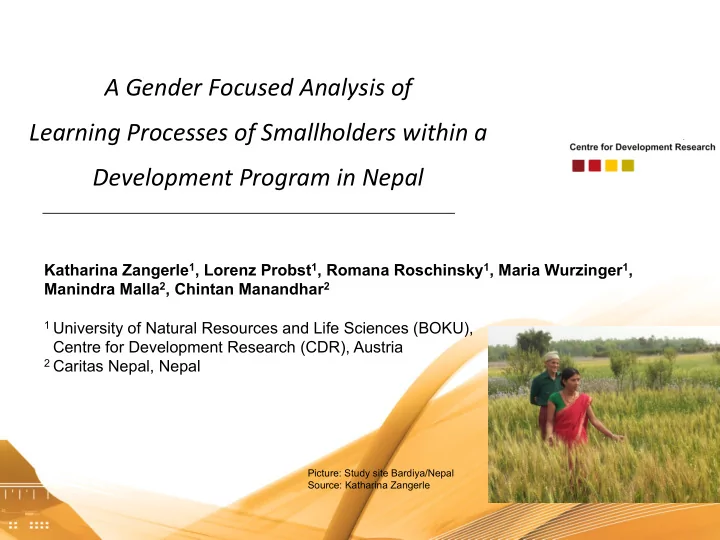

A ¡Gender ¡Focused ¡Analysis ¡of ¡ ¡ Learning ¡Processes ¡of ¡Smallholders ¡within ¡a ¡ ¡ Development ¡Program ¡in ¡Nepal ¡ Katharina Zangerle 1 , Lorenz Probst 1 , Romana Roschinsky 1 , Maria Wurzinger 1 , Manindra Malla 2 , Chintan Manandhar 2 1 University of Natural Resources and Life Sciences (BOKU), Centre for Development Research (CDR), Austria 2 Caritas Nepal, Nepal Picture: Study site Bardiya/Nepal Source: Katharina Zangerle
SAF-BIN key facts: Strengthening Adaptive Farming ¡ in Bangladesh, India & Nepal ¡ ¡ • ¡ ¡ ¡ ¡ ¡ Research ¡and ¡development ¡program ¡ • ¡ ¡ ¡ ¡ ¡Dura4on: ¡5 ¡years; ¡since ¡2011 ¡ Objec4ve: ¡Promote ¡local ¡food ¡and ¡nutri4onal ¡security ¡through ¡adap4ve ¡small ¡ • scale ¡farming ¡in ¡the ¡context ¡of ¡climate ¡change ¡(SAF-‑BIN ¡2011) ¡ 2 ¡ Katharina ¡Zangerle ¡
SAF-BIN in Nepal & Study Sites Kaski • SAF-BIN in Nepal: Surkhet 4 districts, 28 villages, 3-4 farmers groups/ village, about 15 persons/ group • Study Sites: Mixed farming systems, Nawalparasi à subsistence- oriented Bardiya Bardiya: Mid western à plains Kaski: Mid- hills à 3 ¡ Katharina ¡Zangerle ¡
Research Questions ¡ à ¡ ¡ ¡In ¡which ¡ways ¡do ¡the ¡ac4vi4es ¡within ¡SAF-‑BIN ¡allow ¡learning? ¡ ¡ à ¡ ¡ ¡Which ¡learning ¡outcomes ¡are ¡realized? ¡ à ¡ ¡ ¡In ¡which ¡way ¡do ¡these ¡learning ¡outcomes ¡differ ¡between ¡men ¡and ¡women? ¡ ¡ ¡ ¡ 4 ¡ Katharina ¡Zangerle ¡
Theoretical approach ¡ Transforma2ve ¡Learning ¡Theory ¡ • ¡ à ¡Cri4cal ¡reflec4on, ¡Dialogue, ¡Individual ¡experience ¡are ¡essen4al ¡for ¡learning ¡ ¡ ¡ ¡ ¡ ¡ ¡ ¡ ¡ ¡ à ¡ ¡Instrumental ¡learning ¡....... ¡gaining ¡technical ¡skills ¡and ¡knowledge ¡ ¡ ¡ ¡ à ¡ ¡Communica4ve ¡learning ¡… ¡communica4on ¡skills ¡ ¡ ¡(Mezirow ¡et ¡al. ¡2009) ¡ ¡ ¡ Gender ¡perspec2ves ¡ ¡ • ¡ à ¡Theory ¡of ¡prac4cal ¡and ¡strategic ¡gender ¡needs ¡(Moser ¡1993) ¡ ¡ à ¡Intersec4onali4es ¡(Crenshaw ¡2004) ¡ ¡ ¡ 5 ¡ Katharina ¡Zangerle ¡
Methodology – Qualitative design • ¡ ¡ ¡ 2-‑months ¡field ¡study ¡ ¡ à ¡ ¡Problem-‑centered ¡interviews ¡with ¡SHFs ¡(#22) ¡and ¡project ¡staff ¡(#11) ¡ à ¡ ¡Observa4on: ¡living ¡context ¡and ¡learning ¡ac4vi4es ¡(group ¡mee4ngs, ¡field ¡trials) ¡ ¡ à ¡ ¡Field-‑work ¡diary, ¡records, ¡photographs, ¡transcrip4on ¡with ¡so_ware ¡f5 ¡ • ¡ ¡ ¡Analysis ¡ à ¡ ¡Descrip4ve ¡sta4s4cs ¡ à ¡ ¡Content ¡Analysis ¡and ¡Comprehensive ¡Structural ¡Analysis ¡(Lueger ¡2010) ¡ ¡ ¡ ¡ ¡ ¡ ¡with ¡so_ware ¡Atlas.4 ¡ ¡ ¡ ¡ 6 ¡ Katharina ¡Zangerle ¡
Results I: Gender distribution & learning activities ¡ ¡ • ¡ ¡Group ¡mee2ngs ¡ Bardiya Kaski Female Male Female Male • ¡ ¡Design ¡of ¡plots ¡ Group 1 13 2 14 1 • ¡ ¡Monitoring ¡of ¡field ¡trials ¡ Group 2 8 7 13 2 • ¡ ¡Interpreta2on ¡of ¡results ¡ ¡ ¡ Group 3 13 2 13 3 à ¡These ¡ac4vi4es ¡allow ¡ ¡ ¡ ¡ ¡ ¡ ¡ ¡ ¡ ¡ ¡transforma4ve ¡learning ¡through ¡the ¡ à Different ¡age ¡classes, ¡ethnici4es, ¡ ¡ ¡ ¡ ¡ ¡ ¡ ¡ ¡ ¡par4cipa4ve ¡character ¡ ¡ ¡ ¡ ¡ ¡ ¡ ¡marital ¡status ¡ ¡ ¡ ¡ ¡ ¡ ¡ ¡ ¡and ¡suppor4ve ¡project ¡staff ¡ ¡ ¡ 7 ¡ Katharina ¡Zangerle ¡
Results II: Instrumental learning outcomes Topic ¡ Learning ¡outcomes ¡ Notable ¡gender ¡outcome ¡ Climate ¡Change ¡ Knowledge ¡about ¡global ¡and ¡regional ¡ -‑ ¡ ¡ Climate ¡Change ¡(CC), ¡CC ¡adap4on, ¡links ¡ between ¡CC ¡and ¡farming ¡ ¡ Cul4va4on ¡ Use ¡of ¡different ¡crop ¡varie4es/ ¡Line ¡ Especially ¡men ¡ prac4ces/ ¡ sowing ¡instead ¡of ¡broadcas4ng/ ¡ Inputs ¡ ¡ ¡ Applica4on ¡of ¡organic ¡fer4lizers/ ¡ mulching ¡ Management ¡ IPM/ ¡Water ¡management/ ¡Farm ¡ Especially ¡men ¡ ¡ management ¡ Health ¡ Nutrients ¡(applica4on: ¡cooking, ¡kitchen ¡ Especially ¡women ¡learned ¡ gardening), ¡Poten4al ¡impacts ¡of ¡ about ¡health ¡issues ¡ chemical ¡pes4cides ¡and ¡fer4lizers ¡on ¡ health ¡ ¡ Farming ¡as ¡ Sell ¡vegetables ¡at ¡market, ¡ business ¡ diversifica4on ¡and ¡professionaliza4on ¡ ¡ 8 ¡ Katharina ¡Zangerle ¡
Results III: Communicative learning outcomes Topic ¡ Learning ¡outcomes ¡ Notable ¡gender ¡outcome ¡ Planning ¡ Defining ¡problems ¡and ¡short-‑term ¡ Especially ¡women ¡ ¡ and ¡long-‑term ¡objec4ves ¡ Management ¡ Organiza4on ¡skills ¡e.g. ¡assign ¡ -‑ ¡ func4ons ¡of ¡group ¡members ¡ Communica4on ¡ Presenta4on ¡skills ¡and ¡techniques, ¡ Especially ¡women ¡(except ¡ networking, ¡decision ¡making, ¡self-‑ for ¡decision ¡making!) ¡ confidence ¡ ¡ Analy4cal ¡ Analy4cal ¡and ¡methodological ¡ -‑ ¡ capaci4es ¡ awareness ¡ Concepts ¡ Concepts ¡e.g. ¡sustainability, ¡ Especially ¡ ¡ empowerment, ¡leadership, ¡ ¡ women ¡ ¡ gender ¡equality, ¡capacity ¡building ¡ 9 ¡ Katharina ¡Zangerle ¡
Conclusions à Participative and regular activities & skilled facilitators support learning à SAF-BIN can be a platform for transformative learning à Men are more likely to achieve technical learning outcomes and women are more likely to achieve communicative learning outcomes à Topics for further research • Results indicated that mixed smallholder farmers’ collectives regarding different socioeconomic factors facilitated elements of transformative learning • Project activities facilitated elements of transformative learning also for project staff and non-participating farmers. 10 ¡ Katharina ¡Zangerle ¡ ¡
¡ References ¡ ¡ Crenshaw, K. (2004): Intersectionality: The Double Bind of Race and Gender. Perspectives Magazine. (online): http://www.americanbar.org/content/dam/aba/publishing/perspectives_magazine/ women_perspectives_Spring2004CrenshawPSP.authcheckdam.pdf. [Abgerufen: 13.06.2015]. Duggan, L., Nisonoff, L., Visvanathan, N., Wiegersma, N. (2006): The Women, Gender and Development Reader. Sixth impression. Malaysia: Forum. Farming First (2013): The female facts of farming. (online) http://www.farmingfirst.org/portal/gender/. [Abgerufen: 25.01.2013]. Giro (2009): Food and Agriculture Organization of the United Nations (FAO) (2014): Fact Sheet Nepal. Women in Agriculture, Environment and Rural Production. (online) ftp://ftp.fao.org/sd/sdw/sdww/Nep.pdf [25.07.2014]. Lueger, M. (2010): Interpretative Sozialforschung: die Methoden. Wien : Facultas.WUV. Mezirow, J., Taylor, E.W. & Associates (2009): Transformative Learning in Practice. Insights from Community, Workplace and Higher Education. San Francisco: Jossey-Bass. SAF-BIN (2011): Strengthening Adaptive Farming in Bangladesh, India & Nepal (online) http://www.safbin.org/home. [Abgerufen: 30.10.2013]. 11 ¡ Katharina ¡Zangerle ¡
Recommend
More recommend